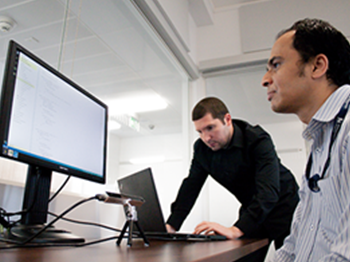University News Last updated 15 May 2019

Microsoft and BCU are developing new technology to help people with disabilities become more independent in the workplace.
As a recipient of funding from Microsoft’s AI for Accessibility programme, the University has been given $20,000 (£15,500) to help develop a prototype technology system that enables people with limited mobility to control computers using voice commands and eye movement.
The new technology aims to unlock a range of careers for people with disabilities by removing the need for a mouse and keyboard. When complete, it could help pave the way for increased participation in professions such as coding, web development and computer programming – which will also contribute to filling nationwide skills gaps.
Senior Lecturer in Human-Computer Interaction Dr Chris Creed, who leads the research project, said: “People who are unable to use a mouse or keyboard can often find themselves excluded from certain technical professions, and we’re exploring ways to remove some of these barriers.”
Dr Creed and a team of researchers are currently developing the first iteration of this system. The prototype will integrate voice commands with eye tracking technologies to enable users to write, edit, and manipulate code efficiently.
Computing Courses
Discover more about our Computing Courses
Richard Southorn, Head of Workplace Adjustment Services at Remploy which specialises in connecting people with disabilities with employment, said: “Improving access to jobs is of the utmost importance if we are to work towards a more equal society, which provides opportunities for people with disabilities. It’s fantastic to see two organisations collaborating on a scheme like this, which can open doors to tech careers for millions of people across the globe.”
AI for Accessibility is Microsoft’s $25 million five-year program aimed at harnessing the power of AI to enhance human capability for the more than one billion people around the world with disabilities. It’s a call to action for developers, NGOs, academics, researchers and inventors to accelerate their work for people with disabilities, focusing on three challenges: Employment, Daily Life, and Communication and Connection.